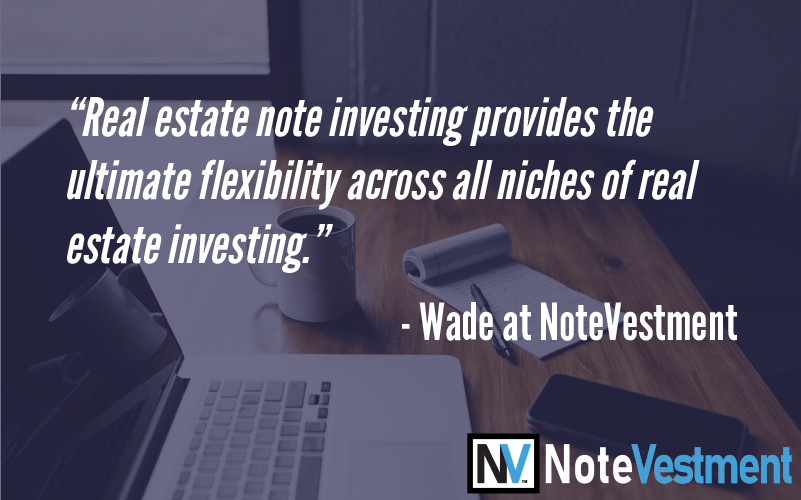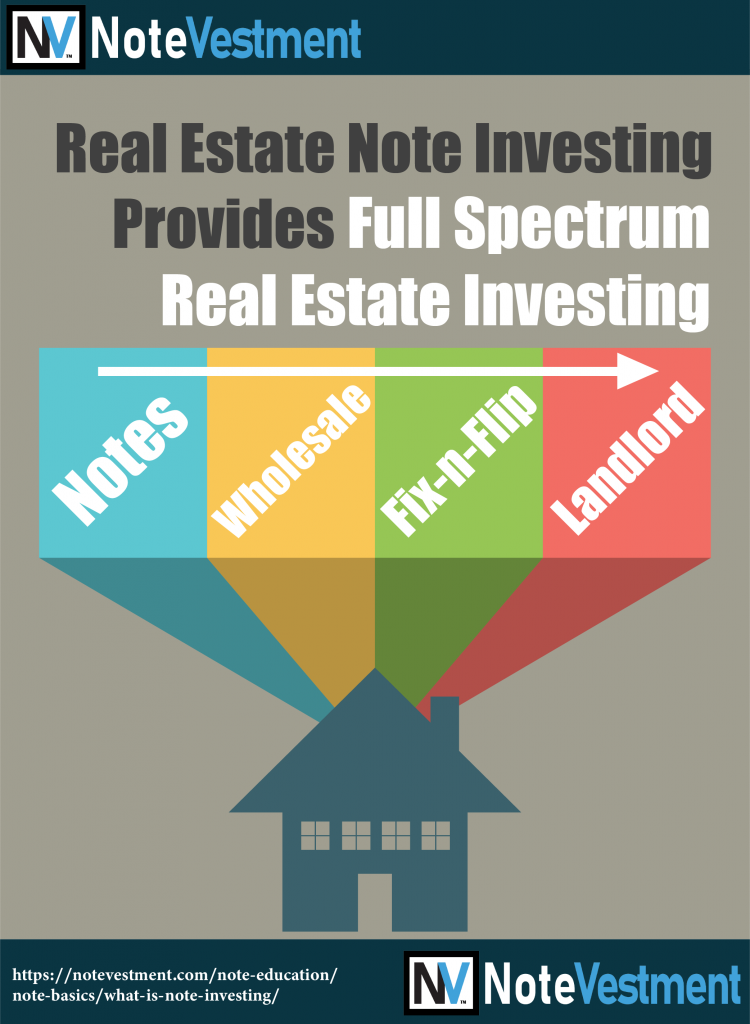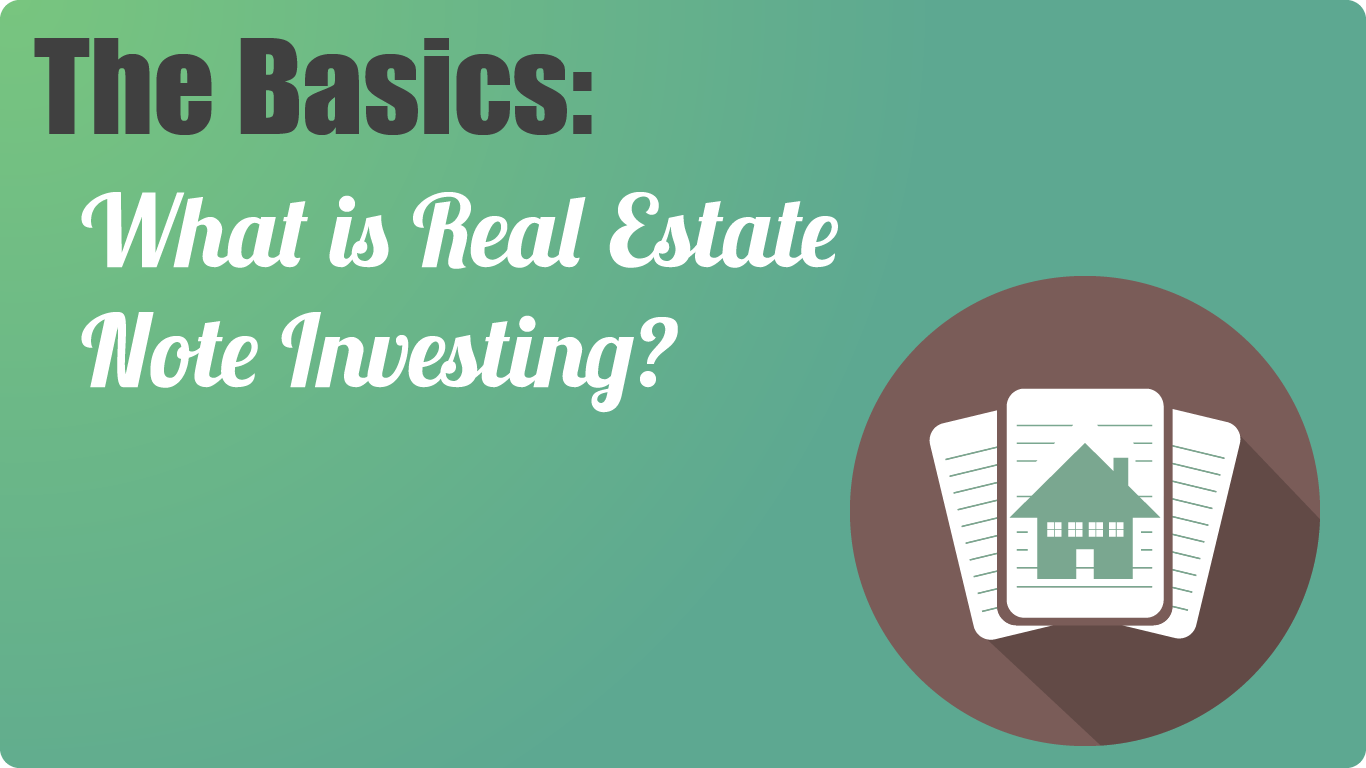What is Real Estate Note Investing?
In its purist form, real estate note investing is acting as the bank and receiving payments from borrowers on notes secured by property. A key point is that these notes are backed and secured by underlying collateral in the form of real estate, which provides a secured investment unlike stocks or mutual funds. Additionally, note investors don’t have to worry about the maintenance and repairs on a property. I don’t know about you, but I’ve never called my bank to ask them to fix the leaky toilet or replace the windows on my home. They would laugh me off the phone.
Additionally, real estate notes can be purchased nationwide, regardless of where you currently live, however licenses may be required in certain states to be able to invest in notes within that state.The real estate note investing space attracts many investors due to the above average rates of return that can be gained, the superior flexibility note investing offers and the additional benefit of helping families stay in their homes, which would otherwise be foreclosed on by the big banks and financial institutions.

Types of Real Estate Backed Notes
1st and 2nd Position
While there are many different types of real estate backed notes such as residential, commercial or land, the majority of all notes fall into either the 1sts or 2nds space. 1st and 2nd refers to the position of the lien relative to the property or collateral that is securing the note. It is very important to remember that all 1st position notes have priority over 2nd position notes, and must be satisfied before consideration of a 2nd position note. Both types of real estate backed notes have their inherent advantages and disadvantages, which we’ll talk about in a future post.
Performing and Non-Performing
There are 2 main statuses of real estate backed notes, performing and non-performing notes. Additionally there are subordinate levels of performing notes such as re-performing or sub-performing, which allude to the length a borrower has consistently, or inconsistently, made payments. When a borrower stops making payments on their note, it has become non-performing.
Full Spectrum Real Estate Investing
We at NoteVestment have coined the term Full Spectrum Real Estate Investing when we talk about real estate note investing. While there are numerous advantages to real estate note investing, one of them is that it offers investors the full range of options when analyzing your exit strategy.

Since a real estate note investor is essentially the bank, they can choose how they would like to proceed with their investment. Real estate note investing provides the ultimate flexibility across all niches of real estate investing. You want as many options and exit strategies as possible when you are purchasing an investment, which is where real estate note investing excels. There are four main niches that real estate investors fall into:
- Real Estate Backed Notes
- Wholesale Deals
- Fix-n-Flips
- Landlord or Buy-n-Hold
Full Spectrum Investing Example
Lets go through a simplistic high-level example to show the beauty in the flexibility of real estate notes. A fix-n-flip investor purchases a non-performing real estate backed note, also known as a Non-Performing Note (NPN), from a note broker. The investor either works the note through a foreclosure or obtains a deed-in-lieu, and takes the property over. They then flip the property, renovating it and selling it to the retail market.
Now let’s add a twist to the story, let’s say that the borrower starts making payments again on the note, which is contrary to the fix-n-flip investor’s primary strategy. The investor can sit back and receive the monthly payments from the borrower, or sell a portion or all of the re-performing note to another real estate note investor or institutional buyer. If the investor sells the note, he can cash out and roll his money into the next deal.
Beauty is in Flexibility
The real beauty when it comes to real estate note investing is in the flexibility that it offers those that invest in it. When we talk about flexibility, we’re specifically talking about exit strategies for note investors to cash out of their investment. Not only can a note investor pursue any of the other main real estate investing strategies through the acquisition of a note, he also can work with the borrower to get the note re-performing. Once a note become re-performing with good, on-time pay history, the note can be sold at a substantial markup compared to a non-performing note.
Helping Homeowners
Many note investors have a great feeling of satisfaction when they can help homeowners stay in their homes through some type of loan modification. Unlike big banks or financial institutions that are hamstrung by red tape and government and corporate regulations, individual note investors can offer favorable terms and even debt forgiveness while still hitting above average rates of return. This can be accomplished simply due to the fact that non-performing notes are sold at a discount. As a note investor you can truly create win-win situations for all parties involved.
Closing Thoughts
I hope that this quick introduction into real estate note investing has piqued your interest in this specialized niche of real estate. I talk to many people who never knew this investment niche even existed, but wish that they had found out about it sooner. I’ve spoken to landlords who have liquidated their entire rental portfolio in order to exclusively invest in real estate backed notes. There are great opportunities out there in the note investing space, join us in our journey in the note investing space.
Let us know if you enjoyed this post, or leave a comment below. Shoot us an e-mail at wade@notevestment.com if you have any questions. If you would like to learn about how my son started note investing when he was 12-months old, click here.
Thanks for reading!


